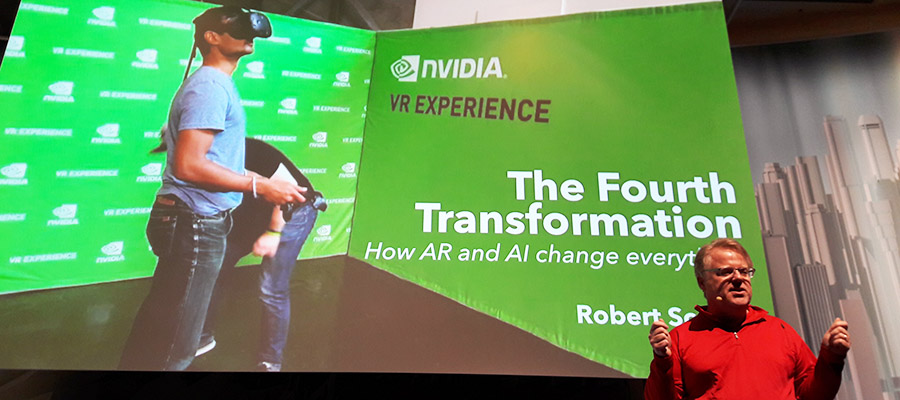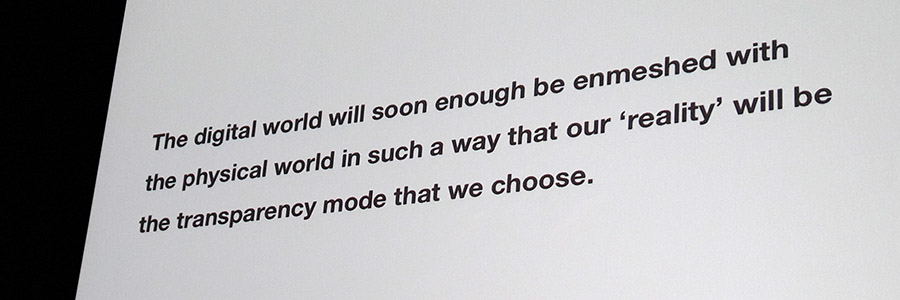The Future of Everything in MR @ Digility

Day 2 and the future
Hey guys, time to continue with my recap! Day two focussed more on start-ups, investments in VR/AR and on the future vision – how does it all continue?
The start-up track had many interesting presentations and discussions, but I won´t go into all details here. Especially since most of it tackled only VR – although many squeezed an “and AR” into their powerpoint titles. The overall message was that you must start with VR today to learn, that it will have great impact and that it can improve in all areas (efficiency at work, entertainment at home, deeper connection in journalistic documentary work, etc). To summarize this business view on the world, let me quote Wolfgang Stelzle from Re´flekt:
AR and VR is still in its infancy. The majority of companies´s [activities in AR/VR] are pre-product. So, it does not matter how you start – but please start now!
Everybody agreed on this during the day and the feeling was (again) that augmented reality will be bigger in corporate environments: managers don´t make a fool of themselves (you still act in your real world along) and existing tasks and product views can be augmented. The right integration of AR is crucial and big companies start doing so (e.g. ThyssenKrupp just ordered 24.000 Hololenses, as rumoured by Stelzle).
In the year 2525…
But where could this lead? What will happen? The main track of day 2 was looking deeper into these questions. It started off in the morning with IT guru Robert “The Scobleizer” Scoble and his vision.
To step us through that he was basically rounding up all cool demos (by others) that float around in the web right now. Be it the ILM xLAB example on Star Wars on Magic Leap, the facebook social VR experience with your virtual selfie stick, the Dokodemo Hololens video or Project Arena for sports in VR.

Robert says that we are in the 4th transformation in computing and that AR and AI will change everything. 1st, stepping into PCs, then mobile, touch interfaces and now VR and AR. We should have VR in our homes today to understand what will be coming. In 2-4 years AR should become very important and that within the next 6 years it will be totally mainstream – “the tech is coming”.
For him, Mixed Reality is the combination of six technologies that need to be tackled (optics, fast uplinks, eye & room tracking, spatial audio and categorization). Categorization? To recognize the objects around you and to identify these. What are these objects? What do they do? 3D image recognition plus artificial intelligence will do the major trick for big AR scenarios. Developing bigger solutions will only scale up with AI in the back.
But what about current devices? Bulky headset will be a thing of the past very soon, Robert claims. With the new Snapchat goggles in the background he states:
Tech in glasses will be as small as a sugar cube within 2 years! The glasses will get cheap and everybody will wear them all the time. 5 years from now your entire life and world is gonna be flipped! It´s gonna be an incredible time.
Scared? Let´s not be. Can´t wait to design this, guys, happy to be part of this new era – I`d say!
Losing my VRginity
Prof. Dr. Frank Steinicke from the University of Hamburg continued and went a bit backwards in the history of VR. The first VR wave in the 90s failed. The tech was just not ready: he shows us some old HMDs and locomotion devices – I remember trying that thing during CeBIT´96, it was really crappy! But a second reason could have been that computers became a boy´s toy in the 80s (we had the first wave of nerd series on TV back then – think of Riptide!). This social change and the (less socially centered) recognition of tech might have also hindered a flourishing, so Steinicke.
But now with all smartphone tech and computing power we just might make it this time! In 15 years computing power will be 1000 x faster than today (if Moore continues) and the uncanny valley should be done for (see the evolution of Lara).
If the immersion and representation is that perfect, we might be able to create empathy through AR and VR – and have the biggest impact on society then! The same idea was transported during the panel afterwards.
A world like Snowcrash… without the weird stuff
We should use the tech as an empathy machine. To connect with others and to create emotions. We should use it for the better. Often quoted great classics as the book Snowcrash or the younger Ready Player One could become a reality sooner than we think. We just need to avoid the weird stuff! People will be spending too much time in VR and AR. It will be a problem. Robert adds:
VR is ten times more effective than morphine. It´s a new drug!
Being so powerful, VR will play a key role in teaching and we must therefore watch out to get it right for the next generation. People will be crying in their headsets. But also productivity will go up once everything works untethered and with a higher resolution. No more screens will cluster our desks. All virtual screens will clean up the place. Tools like Tilt Brush are a great example of the new upcoming things: you just cannot do that without AR and VR. Here the new tech creates something entirely new. This is the direction we need to be going!
The Future of Everything
So, let´s use the tech to be more productive, more entertained, but even more to create empathy and to connect with others. How much time will it be in VR and AR?
Ela Darling talked about her virtual reality porn and adult business here. VR can enable your fantasies – you could live your dreams that are not possible in real life. You can be yourself and be genuine. You have the chance to really connect to someone. Both can walk away satisfied – be it physically or in a therapeutic way. (Ela says, the business is 20% sex and 80% therapy.)
The closing panel continued to dream about the best use of the technology – without talking about the technology itself. It was moderated by wonderful Monika Bielskyte (who did a great calm metaverse poem before). Howard Goldkrand (SapientNitro), Marshall Millett (Aemass) and Alysha Naples joined the great philosophical campfire chat. Let me only quote very briefly, though unfair.

We must use the great opportunity we have today to let people understand and connect. Let´s not wait for the technology to be perfect until we can start thinking about these social questions. Let´s rather do little steps today and trigger small changes. Let´s go beyond borders and start something new. Completely new. Marshall:
If something like a zombie shooter game is the killer app for AR and VR, we have a problem!
Howard adds that we should disrupt the current state and that we should “be an amazing glitch in the system”. We can step out of our comfort environment into new worlds. Alysha:
We can create a landscape that gives you the feeling of being 100% out of your known system. If you can do this – why create a shooting game? Let´s create wonder with this!
Let´s create mixed reality experiences to let plurality exist, Monika adds. Let´s envoke tolerance and curiosity. Let´s use VR to help us make better decicions in life!

The nice wrap-up and look into the future went on like this for a longer time and was a perfect final moment for the conference. How will the metaverse grow? Will it flourish uncontrolled or proliferate? How can we use the tech for best? Could we go for a “What-if”-machine with AI to visualize alternate versions of reality? How can it help humanity?
Conclusion
Well, not so easy to have a simple tweet-length conclusion here. The conference sure touched both sides: the technology/business and the social implications it might all have. Chapeau, for this, Digility! On the tech side it would have been interesting to see more behind-closed-doors demos in AR (come on, every big company has a Hololens right now!) to get updated in a bunch. Probably this will be due next year at Digility then. For now, it could have been a bit more in AR in practical use cases. But the abstract discussions touched nicely both – AR and VR.
Well, today, it felt good to briefly quote more on the social impact side of all this. We might be at a dawn of a new computing age that will change the world like the industrial revolution or later the internet!
So, let´s take our time, slow down and create something great. After all, it is in our own human engineering and artisty hands to do so! :-)
End of file.
